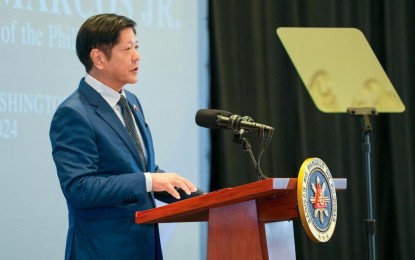
President Ferdinand R. Marcos Jr. (File Photo)
MANILA – President Ferdinand R. Marcos Jr. on Monday said the Philippines has no plan to open additional bases for United States (US) forces in the country under the Enhanced Defense Cooperation Agreement (EDCA).
“The Philippines has no plan to open, (or) to establish more EDCA bases,” Marcos said in a media forum, his first public engagement since the historic trilateral summit in Washington between the Philippines, and its allies Japan and the US.
In February last year, Marcos granted the country's long standing ally access to four more Philippine military camps on top of the five existing locations under the EDCA– the Naval Base Camilo Osias in Sta. Ana, Cagayan; Lal-lo Airport in Lal-lo, Cagayan; Camp Melchor Dela Cruz in Gamu, Isabela; and Balabac Island in Palawan.
The first five EDCA locations were Basa Air Base in Pampanga, Fort Magsaysay in Nueva Ecija, Lumbia Air Base in Cagayan de Oro, Antonio Bautista Air Base in Palawan, and Mactan Benito Ebuen Air Base in Cebu.
Signed in 2014, the EDCA provides for Philippine and US militaries to train together and allows the US to build facilities and preposition supplies, and equipment inside strategically located bases in the country.
Japan to join Balikatan?
In the same media forum, Marcos also welcomed the idea of having Japan participate in the annual Balikatan exercise between Philippine and US forces.
This came after the Philippines, US, Japan, and Australia held a successful quad navy exercise in the West Philippine Sea last April 7.
“I don’t see any reason why Japan should be part of those exercises in the future. That again is a good move for us to make simply because it will make it easier for us to work together and to coordinate together, and do the most,” Marcos said.
’RAA with Japan different from VFA’
Marcos also explained that the planned Reciprocal Access Agreement (RAA) between the Philippines and Japan would be different from the country’s Visiting Forces Agreement (VFA) with the US.
”It’s not the same as a Visiting Forces Agreement. It’s not similar – we’ve had problems with that with the Americans, some American forces, we all know. It’s very, very different from what the Reciprocal Agreement will be with the Japanese,” Marcos said when asked which country should take custody of erring Japanese servicemen in case the RAA is approved.
”It’s not going to be as if it’s their base and they, their seamen will come down and will go into the city and go – I don’t think that that’s a part of the agreement.”
The VFA accorded legal status to US troops who were rotated in the country for military exercises and humanitarian assistance operations.
Among its points of contention is the criminal jurisdiction related to American soldiers violating Philippine laws.
PH monitoring US polls closely
The President also admitted that the Philippines is closely monitoring the political landscape in the US as it is set to hold another presidential election in November.
President Joe Biden, who has repeatedly expressed his commitment to supporting the Philippines in the West Philippine Sea dispute, is poised for another election showdown with his predecessor, Donald Trump. Biden defeated Trump in 2020.
Asked if the Philippines is wary that a Trump administration will not offer the same ironclad commitment that the Biden leadership has repeatedly made, Marcos said the Philippine government is eagerly examining who is going to be in-charge.
“If President Biden is reelected, then we have a fairly solid ground to base our positions on because we have already spoken with him,” Marcos said.
“But, inevitably, if there is a change in government, then there would be changes in policy. We do not know what those are. But, I believe what we have agreed with the United States is beyond politics. I think that since they almost rise to treaty agreements, those treaty agreements must be honored. That, I think, puts us on ground,” he added. (PNA)
